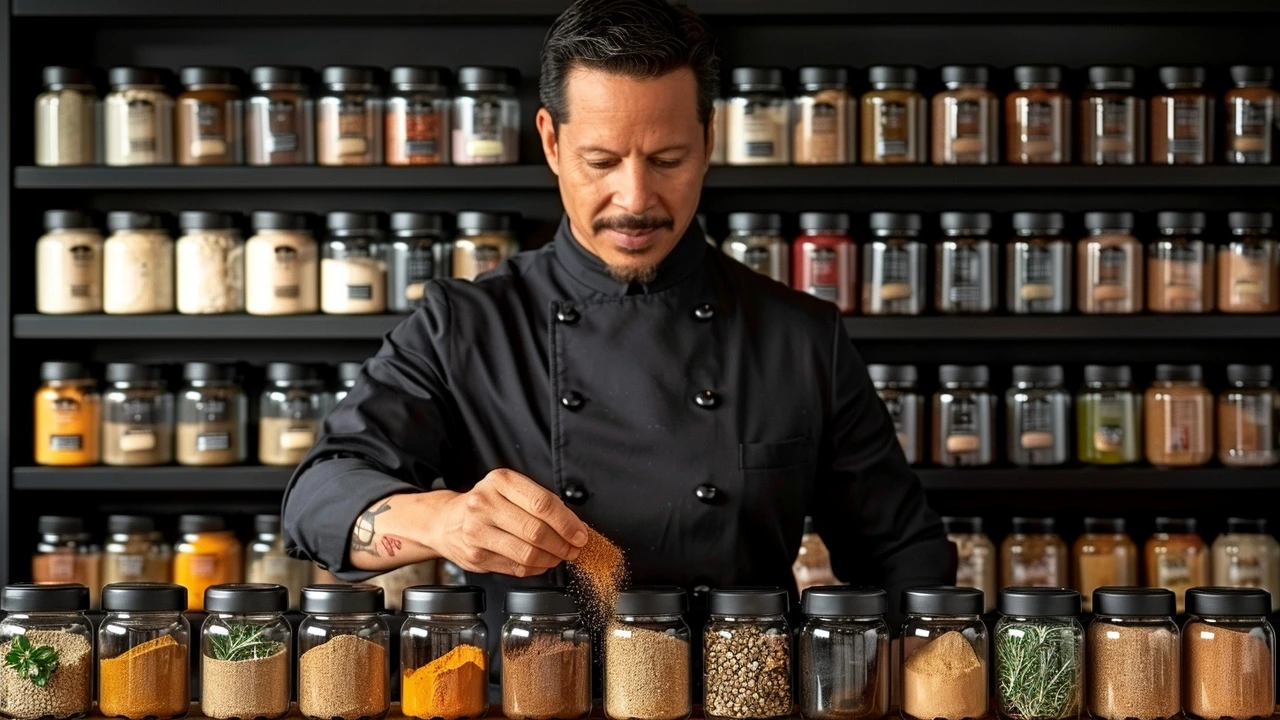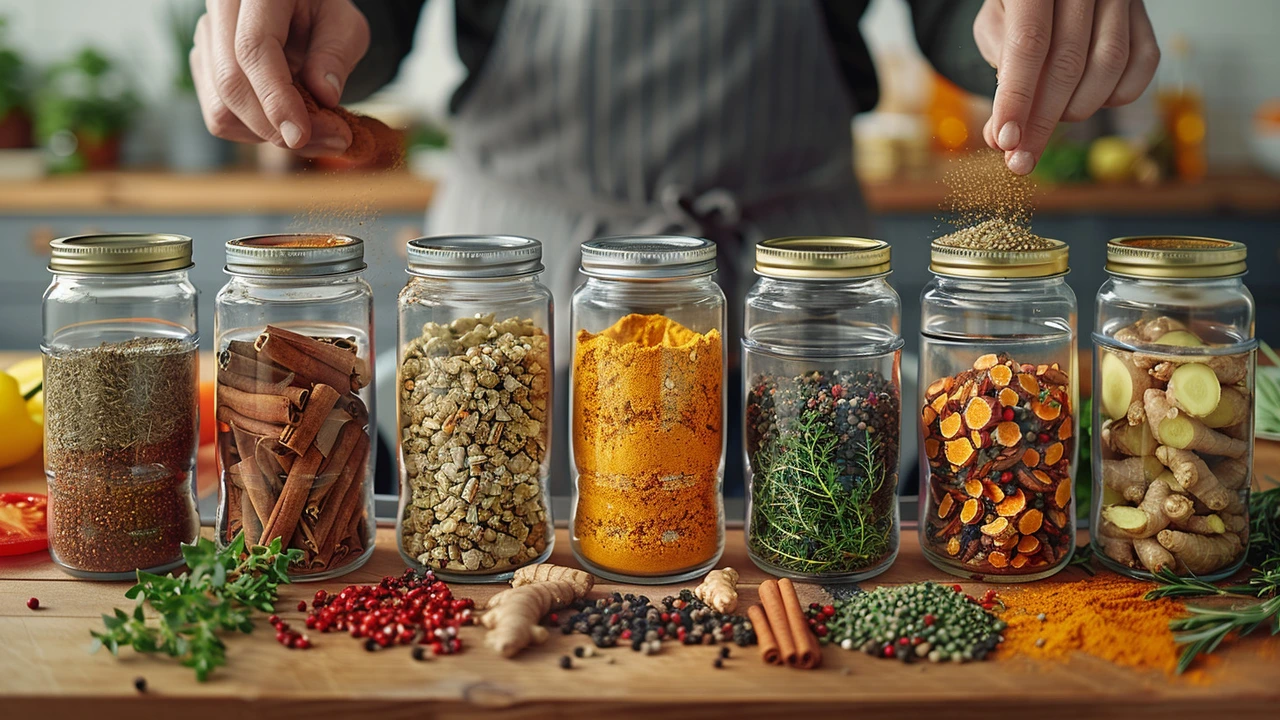When you think of spices, your mind probably goes to their culinary uses. But did you know these flavorful additions to your meals also pack a punch in terms of health benefits? It's fascinating to discover how something as simple as a pinch of spice can contribute significantly to your well-being.
Many cultures have utilized spices not just for cooking, but also for their medicinal properties. Let's dive into some of the lesser-known health benefits of these kitchen staples and explore how they can make a positive impact on your life.
- Introduction to Spice Benefits
- Boosting Immunity
- Improving Digestion
- Fighting Inflammation
- Enhancing Metabolism
- Tips on Incorporating Spices
Introduction to Spice Benefits
Spices have been an integral part of culinary traditions worldwide, but their role goes beyond just adding flavor to our food. Historical records show that spices have been cherished not only for their taste but also for their medicinal properties. Many ancient civilizations, like the Egyptians, Greeks, and Chinese, utilized spices as natural remedies for various ailments.
In modern times, scientific research has begun to catch up with traditional knowledge, revealing the remarkable health benefits that spices can offer. For example, turmeric, often used in Indian cuisine, contains curcumin, which is known for its anti-inflammatory and antioxidant properties. Research has indicated that curcumin can help in managing conditions like arthritis and may even play a role in cancer prevention.
“Spices are far more potent than most people realize. Their health benefits, backed by scientific evidence, are undeniable,” says Dr. Michael Greger, author of 'How Not to Die.'
Another common spice, ginger, is lauded for its ability to soothe digestive issues and reduce nausea. Its bioactive compound, gingerol, has powerful anti-inflammatory and antioxidant effects, making it a multipurpose kitchen staple. Similarly, cinnamon is not just for your morning toast; its compounds can help regulate blood sugar levels and improve insulin sensitivity.
Scientifically, many spices contain bioactive compounds that interact with our body's systems, offering myriad health benefits. For instance, capsaicin in chili peppers is known to boost metabolism and promote heart health by improving blood circulation. Meanwhile, garlic, another everyday spice, contains allicin, which can help reduce cholesterol levels and lower blood pressure.
Moreover, these benefits are not mere suggestions. They are backed by numerous studies and research papers published in medical journals. A study published in the 'Journal of Medicinal Food' highlighted that daily consumption of spices like cloves and bay leaves could significantly reduce the risk of chronic diseases.
Navigating through the different types of spices and understanding their benefits can be overwhelming, but it is worth the effort. Including a variety of spices in your diet not only enhances your meals but also improves your health. The key is to start small and gradually incorporate these health-boosting spices into your everyday cooking.
In upcoming sections, we will delve deeper into specific categories of health benefits that spices can offer, such as boosting immunity, improving digestion, and fighting inflammation. Whether you are a seasoned cook or a newbie in the kitchen, adding a sprinkle of spice to your diet can be a simple yet effective way to enhance your overall health.
Boosting Immunity
Spices are more than just flavor enhancers; they are also powerful agents in boosting immunity. One of the most well-known spices for immune health is turmeric, which contains curcumin, a compound with potent anti-inflammatory and antioxidant properties. Studies have shown that curcumin can enhance the activity of immune cells and improve the body's defense mechanisms against infections and diseases.
Another excellent spice for immune support is ginger, which has been used in traditional medicine for centuries. Ginger contains gingerol, a bioactive compound that helps reduce oxidative stress and inflammation. Consuming ginger can stimulate the production of white blood cells, which are crucial for fighting off pathogens. Additionally, ginger has antiviral and antibacterial properties that further protect the body from harmful microbes.
"The benefits of ginger go beyond its ability to soothe sore throats. Research has shown that regular consumption of this spice can significantly reduce the risk of chronic diseases by enhancing the immune response." - Dr. Jane Collins, Nutrition Expert
Cinnamon is another spice that deserves attention for its immune-boosting abilities. Rich in antioxidants such as polyphenols, cinnamon helps neutralize harmful free radicals in the body. This action prevents cellular damage and supports a healthy immune system. Moreover, cinnamon's anti-inflammatory properties can help reduce symptoms of infections and chronic illnesses.
If you are looking to add more immune-boosting spices to your diet, consider using garlic. Garlic contains allicin, a compound known for its antimicrobial and immune-enhancing effects. Regular consumption of garlic can enhance the function of immune cells and improve the body's ability to ward off infections. Studies have shown that garlic supplements can reduce the incidence of common colds by up to 63%.
Adding a variety of spices to your meals can make a significant difference in your overall health. Incorporating spices like turmeric, ginger, cinnamon, and garlic into your daily diet can provide a natural and effective way to boost your immune system. Not only do these spices add delicious flavors to your dishes, but they also offer numerous health benefits that can enhance your well-being.
Next time you're in the kitchen, don't hesitate to experiment with these powerful spices. Your taste buds—and your immune system—will thank you!

Improving Digestion
Digestion is a crucial process that your body depends on to break down the foods you eat, absorb nutrients, and remove waste. Surprisingly, spices that you typically use to enhance the flavor of your meals can significantly aid your digestive system. Take ginger, for instance, which has been a staple in traditional medicine for its powerful digestive benefits. This root is known to stimulate saliva, bile, and gastric juices, which are essential for smooth digestion.
One of the key spices known to improve digestion is fennel. Fennel seeds contain anethole, a compound that helps relax the muscles of the gastrointestinal tract, thereby reducing bloating and gas. Consuming fennel tea after meals can work wonders for your digestive health. Another fantastic spice is cumin, which promotes the secretion of digestive enzymes, speeding up the digestion process and preventing discomfort.
"Spices like ginger and turmeric have been shown to have anti-inflammatory properties that can benefit the digestive system," says Dr. Michael Murray, a renowned naturopathic doctor.
Also, don't overlook the power of peppermint. Peppermint oil has been studied for its ability to relieve symptoms of irritable bowel syndrome (IBS). The menthol in peppermint has an antispasmodic effect, which soothes the muscles of the digestive tract. Similarly, coriander and carom seeds are traditionally used in various cultures to treat indigestion and increase appetite.
Moreover, incorporating spices such as clove and cardamom into your diet can also contribute to better digestive health. Cloves contain eugenol, which has been shown to enhance the production of digestive enzymes, while cardamom can help in reducing inflammation and easing symptoms of gastritis. Researchers have also found that cinnamon, which is rich in antioxidants, can help maintain blood sugar levels and reduce the risk of metabolic syndrome, a condition often related to digestive problems.
For someone like me, who juggles a busy household with Maxwell, Thalia, and Orion, knowing that adding a dash of these spices can aid digestion is a real gift. Not only do these spices enhance the flavors of our meals, but they also make sure our tummies are happy and healthy. You might want to think of ways to add more of these spices to your daily diet. Sprinkle them onto your dishes, brew them as teas, or even take supplements if that's more convenient for you.
Balancing a healthy diet with the strategic use of these common spices can make a massive difference in your digestive health. Remember, it's the little things that often have the biggest impact.
Fighting Inflammation
One of the significant yet often overlooked benefits of spices is their ability to fight inflammation. Chronic inflammation is at the root of many diseases, including heart disease, diabetes, and arthritis. By incorporating anti-inflammatory spices into your diet, you can help your body combat these conditions naturally.
Turmeric, for example, is a powerhouse when it comes to reducing inflammation. Its active compound, curcumin, has been shown to have powerful anti-inflammatory effects. According to a study published in the Journal of Medicinal Food, curcumin is as effective as some anti-inflammatory drugs but without the side effects. Adding turmeric to your meals can be as simple as sprinkling it over roasted vegetables or stirring it into soups and stews.
Ginger is another spice that offers substantial anti-inflammatory properties. It contains bioactive compounds like gingerol, which can help lower inflammation and reduce pain. A study in the journal Osteoarthritis and Cartilage reported that ginger extract helped reduce pain and stiffness in people with osteoarthritis. You can incorporate ginger into your diet by adding it to teas, smoothies, or even baking it into healthy treats.
Cinnamon is not just for baking! This sweet spice has potent anti-inflammatory effects due to its high concentration of cinnamaldehyde. Research published in the journal Food & Function found that cinnamon can help reduce inflammation markers in the body. Adding a pinch of cinnamon to your oatmeal, coffee, or even savory dishes like chili can be an easy and delicious way to reap its benefits.
Cloves contain a compound called eugenol, which has both anti-inflammatory and pain-relieving properties. A study in the International Journal of Dentistry showed that eugenol can help reduce inflammation, particularly in cases of dental pain. You can use cloves in marinades, mulled drinks, or grind them and add to spice blends for a healthful boost.
CNN Health highlights, "Spices like turmeric, ginger, cinnamon, and cloves are essential in your arsenal against chronic inflammation. They offer a natural way to mitigate inflammation and can easily be integrated into your daily meals."
Whether you're dealing with chronic conditions or just looking to enhance your overall health, these spices offer a surprisingly effective solution. With simple tweaks to your cooking routine, you can harness their powerful anti-inflammatory properties and enjoy both delicious flavors and better health.

Enhancing Metabolism
Metabolism is a term that gets tossed around a lot, especially when it comes to weight loss and energy levels. It refers to the chemical processes in your body that keep you alive and functioning. A faster metabolism means your body burns calories more efficiently, which can be a game-changer for those looking to shed some pounds or maintain their current weight. Believe it or not, certain spices can give your metabolism the boost it needs.
Cayenne pepper is one of the most well-known spices for its metabolic benefits. The key compound in cayenne pepper is capsaicin, which has been shown to increase metabolic rate by raising body temperature. This process, called thermogenesis, can help you burn more calories throughout the day. Imagine adding a sprinkle of cayenne to your morning eggs or your dinner stew - it's a small change that can have significant effects over time.
Another spice that deserves a shoutout is ginger. Ginger has anti-inflammatory properties and can help with digestion, but it also plays a role in improving metabolism. Studies suggest that ginger can enhance calorie burn and reduce hunger, making it easier to stick to a healthy eating plan. Adding fresh ginger to your smoothies or teas is a simple and delicious way to incorporate it into your diet.
"Adding thermogenic spices like cayenne and ginger to your diet can increase metabolism and aid in weight management," says Dr. Andrew Weil, a pioneer in the field of integrative medicine.
Another fantastic spice for metabolism is cinnamon. This sweet spice can not only satisfy your sugar cravings but also improve insulin sensitivity, which helps regulate blood sugar levels. When your blood sugar levels are stable, your body is less likely to store fat and more likely to use it as energy. You can sprinkle cinnamon on your oatmeal, add it to your coffee, or use it in savory dishes like curries for an extra health boost.
Turmeric, often touted for its anti-inflammatory effects, also plays a role in metabolism. Curcumin, the active ingredient in turmeric, can help reduce fat tissue growth and enhance calorie burn. Incorporating turmeric into your meals is easy - think about adding it to soups, stir-fries, or even your morning scramble.
Finally, don't overlook the humble black pepper. Black pepper contains piperine, a compound that has been shown to enhance fat metabolism. Piperine also helps improve the absorption of other nutrients, making your meals not only tastier but more nutritious.
Embracing these spices doesn't require a drastic change in your diet. Simple additions and swaps can make a big difference. Here are a few tips to get you started:
- Add a pinch of cayenne pepper to your soups and stews.
- Mix ginger into your smoothies or brew a cup of ginger tea.
- Sprinkle cinnamon on your morning oatmeal or coffee.
- Use turmeric in your scrambled eggs or stir-fries.
- Season your dishes with plenty of black pepper.
These small adjustments can be fun and easy ways to give your metabolism the help it needs, all while making your meals more flavorful and exciting. Try experimenting with different spices and see how they can improve your overall well-being.
Tips on Incorporating Spices
Adding spices to your diet doesn't have to be a complex task. With a bit of creativity and knowledge, you can enhance both the flavor and health benefits of your daily meals. Here are some practical and interesting ways to incorporate these powerful natural ingredients into your routine.
One simple way to start is by sprinkling a bit of cinnamon into your morning coffee or oatmeal. Cinnamon not only adds a delightful aroma and sweetness but also helps regulate blood sugar levels, making it a great addition to your breakfast. According to a study published in the Journal of Medicinal Food, regular consumption of cinnamon can improve glycemic control in people with type 2 diabetes.
For lunch or dinner, try adding turmeric to soups, stews, and curries. Known for its potent anti-inflammatory properties thanks to the compound curcumin, turmeric can aid in reducing joint pain and muscle soreness. A tip for maximizing its benefits: combine turmeric with black pepper. The piperine in black pepper enhances the absorption of curcumin, boosting its efficacy.
"The combination of turmeric and black pepper increases bioavailability up to 2000%," says Dr. Michael Greger in his book How Not to Die.
Another great tip is to use ginger in your cooking. Ginger can be added to stir-fries, smoothies, and even baked goods. It's renowned for its digestive benefits, helping to alleviate nausea and improve gut health. A study in the Journal of Gastroenterology found that ginger can speed up the emptying of the stomach, which is beneficial for people suffering from indigestion and associated discomfort.
For those who enjoy baking, incorporating nutmeg, cloves, and cardamom into your recipes can add a unique flavor profile while providing antioxidant benefits. These spices are particularly high in antioxidants, which help combat oxidative stress and may reduce the risk of chronic diseases.
Spice Blends and Their Uses
If you're unsure where to start, consider using spice blends. Garam masala is an excellent choice for Indian-inspired dishes, while herbes de Provence can elevate the flavor of Mediterranean cuisine. Creating your own spice blend can also be a fun and rewarding process. You can mix cumin, paprika, and coriander for a homemade taco seasoning that skips the preservatives found in store-bought packets.
Don't underestimate the power of herbs like basil, thyme, and oregano. Fresh herbs can be sprinkled over salads, added to marinades, or used to garnish soups and pasta dishes for an extra flavor boost. Plus, they come with their own set of health benefits, including antibacterial and antiviral properties.
Experimenting with Spices
Remember, experimenting with spices can lead to delightful culinary surprises. Start with small amounts and adjust according to your taste preferences. Don't be afraid to mix and match different spices to find your perfect combination. And as always, fresh is best. Whenever possible, opt for fresh herbs and spices rather than dried ones to get the most nutrients and flavor.
By incorporating a variety of spices into your meals, you're not only making your food more enjoyable but also tapping into a wealth of health benefits that have been cherished by cultures around the world for centuries. So go ahead, spice up your life!





